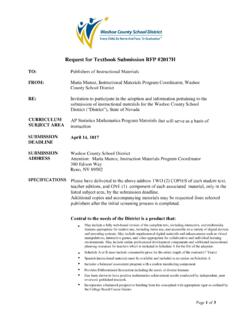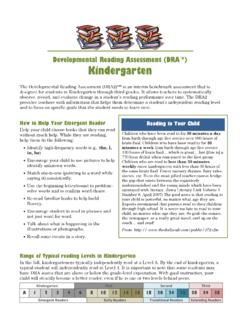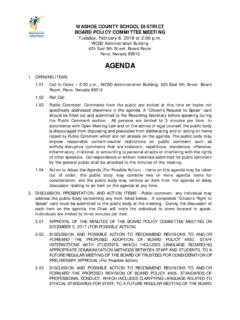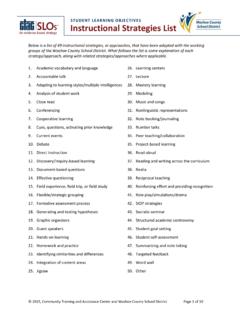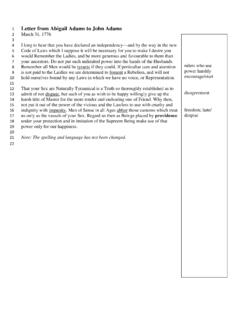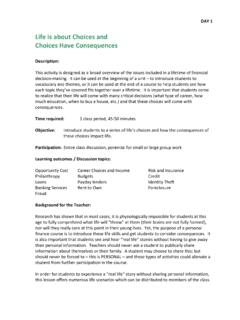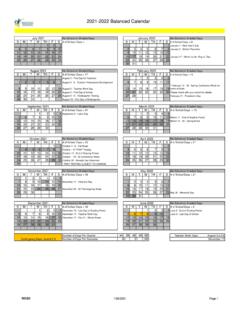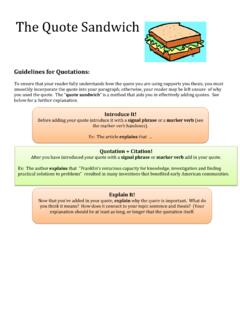Transcription of Developmental Reading Assessment (DRA™) First Grade
1 Developmental Reading Assessment (DRA ). First Grade The Developmental Reading Assessment (DRA2) is an interim benchmark Assessment that is designed for students in Kindergarten through third grades. It allows teachers to systematically observe, record, and evaluate change in a student's Reading performance over time. The DRA2 provides teachers with information that helps them determine a student's independent Reading level and to focus on specific goals that the student needs to learn next. How to Help Your Encourage the Love of Reading Early/Transitional Reader Read aloud. Children love to hear a parent read aloud.
2 Help your child choose books that are an Allow your child to select a favorite story and don't be appropriate level for independent Reading . While surprised if you find yourself Reading the same story over they are Reading , help them do the following: and over. You may also want to select books or magazines Identify high-frequency words ( , the, I, in, about topics that you enjoy, such as a favorite sport or a he). new science discovery. Your own enthusiasm will help your child realize that Reading is an enjoyable and Encourage your child to use pictures to help rewarding experience. Even after your child learns how identify words.
3 To read, don't stop Reading aloud. Match one-to-one (pointing to a word while Allow children to select their own books. Take trips saying it) consistently. to the library or bookstore and let your kids hunt for books that interest them. If you children aren't sure Use beginning letter/sound relationships to where to look, introduce them to the children's librarian. problem-solve words and to confirm word Librarians can tell you the most popular books for kids of choice. all ages. Once your children select a book, support their decisions. Don't push your child into selecting challenging Re-read familiar books to help build fluency.
4 Material. In fact, if a book is too difficult, your child may Encourage student to read in phrases with lose interest in Reading . appropriate expression and not just word for Listen to your child. Once children learn how to read, word. it's important for parents and children to read aloud Model and support how to pay attention to together. This gives children an opportunity to share new punctuation ( , stopping after periods, skills and gives parents the opportunity to praise their pausing after commas) progress. Provide plenty of approval and avoid making corrections. Support self-correction of mistakes.
5 Excerpt From: Portals/0/Tips%20for%20 Range of Typical Reading Levels in First Grade In the fall, First graders typically independently read at a Level 4. By the end of First Grade , a typical First grader will independently read at Level 16. It is important to note that some students may have DRA. scores that are above or below the Grade -level expectation. With good instruction, your child will steadily become a better reader, even if he is one or two levels behind peers. Kindergarten First Second Third A 1 2 3 4 6 8 10 12 14 16 18 20 24 28 30 34 38. Emergent Readers Early Readers Transitional Readers Extending Readers Book Selections What does a book with a level of 4 12 look like?
6 You will find the following characteristics in books that are appropriate for early/transitional readers: Books will have familiar objects, pictures that provide support, actions, vocabulary and situations. Books will be realistic narratives with a sequence of events, fairy tales and folk tales, informational texts, or poetry and songs. The language in the books will contain high-frequency words, 1 2 syllable words, and fairly predictable words. The pages in the books will have approximately 2 6 lines of text (50 to 150 words). How can I find the just right books for my child? There is a range of Reading levels within each Grade .
7 Ask your child's teacher what level your child is at, and request a list of appropriate books. Suggested Books Level 6 Cookie's Week; Ward, Cindy Where's Al?; Barton, Byron The Lady With the Alligator Purse; Westcott, Nadine Footprints in the Snow; Benjamin, Cynthia Level 12. Things I Like; Browne, Anthony Each Peach Pear Plum; Ahlberg, Allan & Janet Sid and Sam; Buck, Nola Mine's the Best; Bonsall, Crosby How Many Bugs in a Box?; Carter, David Snow, The; Burningham, John Wheels; Cobb, Annie Biscuit; Capucilli, Alyssa Satin Happy Birthday, Danny and the Dinosaur; Hoff, Syd Polar Bear, Polar Bear, What Do You See?
8 ; Carle, Eric My Messy Room; Packard, Mary Alligator Shoes; Dorros, Arthur Mary Wore Her Red Dress; Peek, Merle One Fish, Two Fish, Red Fish, Blue Fish; Dr. Seuss It's Game Day; Salem, Lynn & Stewart, J. Growing Vegetable Soup; Ehlert, Lois I Love Mud and Mud Loves Me; Stephens, Vicki More Spaghetti I Say; Gelman. Rita Wake Up, Wake Up!; Wildsmith, B. & R. The Carrot Seed; Kraus, Ruth Sleepy Dog; Ziefert, Harriet Buzz Said the Bee; Lewison, Wendy Level 8 I'm a Caterpillar; Marzollo, Jean Sunshine, Moonshine; Armstrong, Jennifer Great Race, The; McPhail, David Henry's Busy Day; Campbell, Rod Curious George ; Rey, Go Dog Go; Eastman, Philip D.
9 Sheep in a Jeep; Shaw, Nancy Tortillas; Gonzalez-Jensen Level 14. Gum on the Drum; Gregorich, Barbara Goodnight, Moon; Brown, Margaret Wise Traffic Jam; Harper, Leslie George Shrinks; Joyce, William Where's Spot?; Hill, Eric Oliver; Kraus, Robert Oh a Hunting We Will Go; Langstaff, John Put Me in the Zoo; Lopshire, Robert All By Myself; Mayer, Mercer Ear Book; Perkins, Al Great Big Enormous Turnip; Tolstoy, Aleksey Paper Bag Trail; Schreiber, Anne & Doughty, A. Level 16. It Looked Like Spilt Milk; Shaw, Charles Nickels and Pennies; Williams, Deborah Town Mouse and Country Mouse, The; Aesop Three Billy Goats Gruff, The; Brown, Marcia Level 10 Liar, Liar Pants on Fire; Cohen, Miriam Just Like Daddy; Asch, Frank Angus and the Cat; Flack, Marjorie Dark, Dark Tale, A; Brown, Ruth Hattie and the Fox; Fox, Mem Ten Black Dots; Crews, Donald Little Toot; Gramatky, Hardie Across the Stream; Ginsburg, Mirra Reflections; Jonas, Ann SHHH; Henkes, Kevin We Just Moved!
10 ; Krensky, Stephen Amy Loves the Wind; Hoban, Julia Let's Go Froggy; London, Jonathan Johnny Lion's Rubber Boots; Hurd, Edith Thacher Father Bear Comes Home; Minarik, Else H. Rosie's Walk; Hutchins, Pat Dragon's Fat Cat; Pilkey, Dav Itchy, Itchy Chicken Pox; Maccarone, Grace The Little Engine That Could; Piper, Walter Are You There Bear?; Maris, Ron Benny Bakes a Cake; Rice, Eve Bread, Bread, Bread; Morris, Ann We're Going on a Bear Hunt; Rosen, Michael Tiger Is a Scaredy Cat; Phillips, Joan Noisy Nora; Wells, Rosemary Cars; Rockwell, Anne Napping House, The; Wood, Don & Audrey
